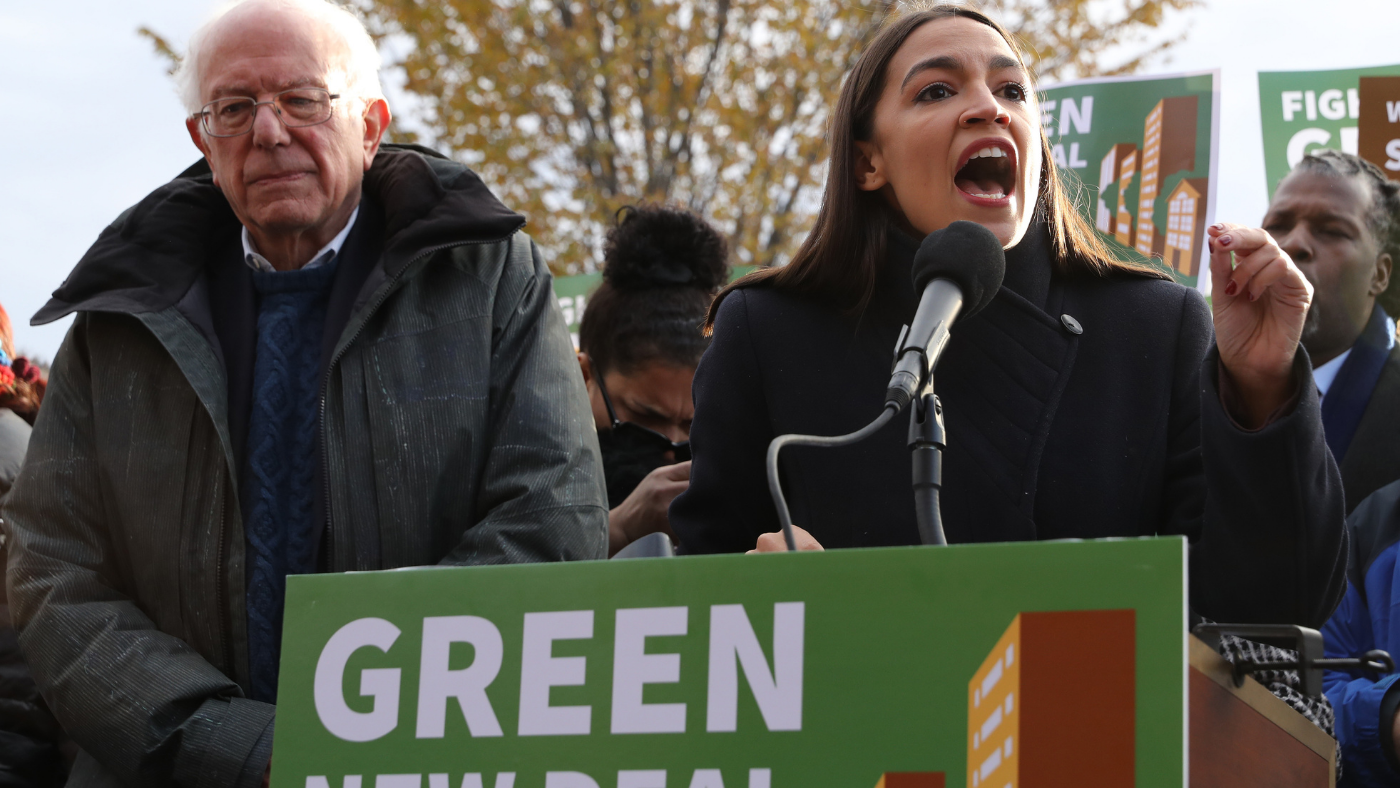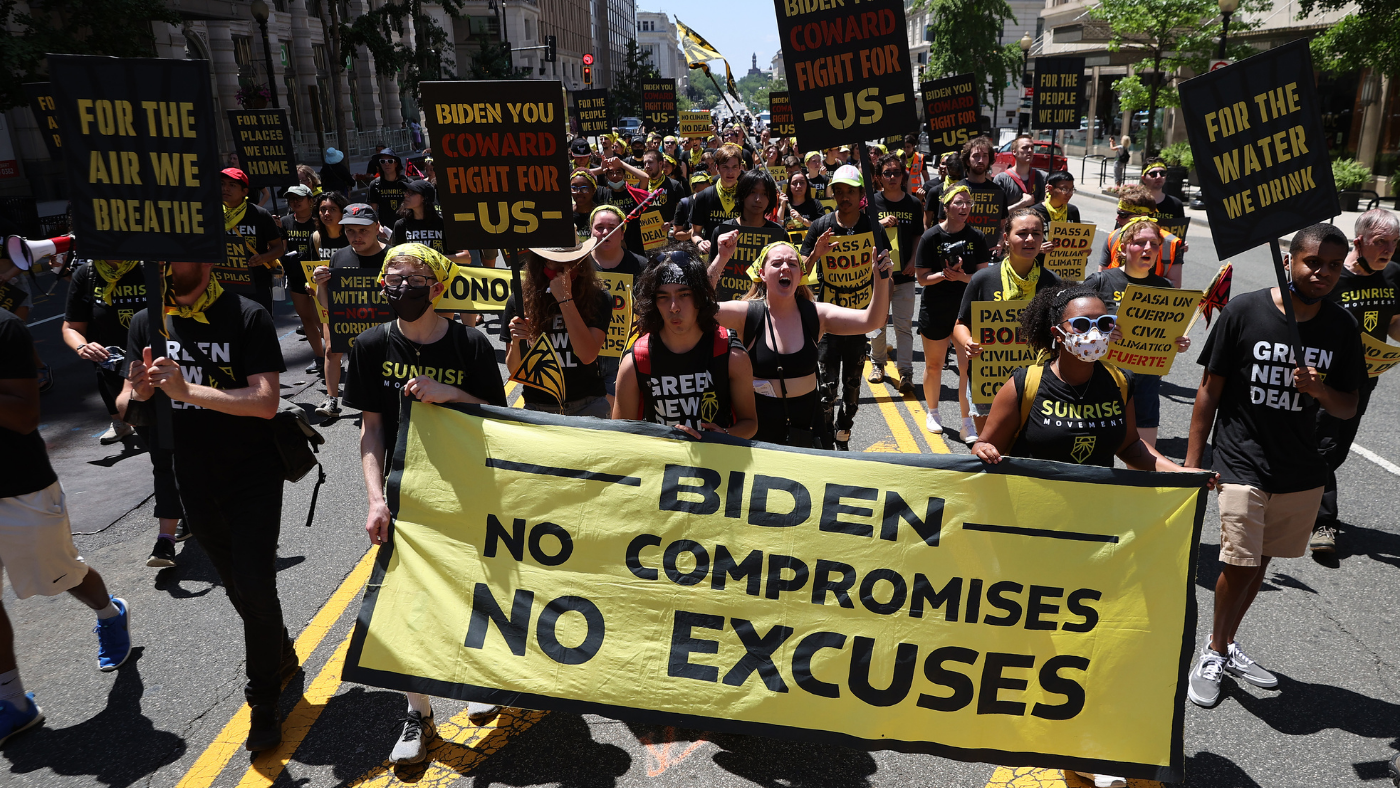What is the Green New Deal?
Ambitious resolution provides ‘framework’ for future climate plans

A free daily email with the biggest news stories of the day – and the best features from TheWeek.com
You are now subscribed
Your newsletter sign-up was successful
As the countdown to the Cop26 climate summit continues, Labour leader Keir Starmer has attempted to rally support for a Green New Deal – a comprehensive package of environmental laws and subsidies.
Writing in The Guardian this week, Starmer predicted a “green transition” if his party came to power, and promised that the cost of change would not fall on the poorest in society. “That is the promise of a Green New Deal,” he said. “An economy that is greener and fairer at the same time.”
The concept of the Green New Deal came to prominence in 2019, when US congresswoman Alexandria Ocasio-Cortez brought “some real attention” to the idea, says Thomas L. Friedman, a New York Times columnist who is credited with coining the term more than a decade ago.
The Week
Escape your echo chamber. Get the facts behind the news, plus analysis from multiple perspectives.

Sign up for The Week's Free Newsletters
From our morning news briefing to a weekly Good News Newsletter, get the best of The Week delivered directly to your inbox.
From our morning news briefing to a weekly Good News Newsletter, get the best of The Week delivered directly to your inbox.
What is the Green New Deal?
In January 2007, Friedman said that a Green New Deal could “revitalise America” and “turn the tide on climate change”.
The precedent was Franklin D. Roosevelt’s far-reaching reforms, enacted between 1933 and 1939 and known collectively as the New Deal. They are credited with transforming the US and catalysing its recovery from the Great Depression.
Barack Obama’s 2008 manifesto included plans for a similarly “broad range of programmes and industrial projects” intended to tackle climate change, but “the idea just never took off”, says Friedman. It was just over a decade later that Ocasio-Cortez and Senator Ed Markey unveiled their Green New Deal resolution.
A free daily email with the biggest news stories of the day – and the best features from TheWeek.com
Key points of their resolution included:
- The creation of millions of well-paid jobs
- Achieving net-zero greenhouse gas emissions “through a fair and just transition for all”
- Securing clean air and water, climate and community resiliency, healthy food, access to nature and a sustainable environment for future generations
- Promoting justice by “stopping”, “preventing” and “repairing” the historic oppression of “frontline and vulnerable communities” including; indigenous peoples, communities of colour, migrant communities, deindustrialised communities, depopulated rural communities, the poor, low-income workers, women, the elderly, the unhoused, people with disabilities and young people
- Ensuring 100% of power supplied in the US comes from renewable and zero-emissions sources
- Overhauling transport infrastructure to remove pollution
The “genius” of their idea is in its provision of “a comprehensive plan” that would benefit the economy while tackling climate change, says the New Statesman. However, turning that plan into policy is a challenge that has yet to be answered.

Ocasio-Cortez and Markey’s resolution – or “revolution” as Markey described it in a tweet on Earth Day last year – is “more of a political brand than a practical programme”, says the Financial Times. Robinson Meyer goes further in The Atlantic, arguing that the Green New Deal “does not exist”.
“You can’t find an authoritative and detailed list of Green New Deal policies anywhere,” he says. “There is no handbook, no draft legislation, no official report that articulates what belongs in a Green New Deal and what doesn’t.” What the resolution boils down to, he concludes, is “not a single policy to win, but a change in outlook and approach”.
That change will require “somewhat of a shift in climate thinking”, says Ecologist magazine, so that climate and other environmental issues are no longer treated as “abstract categories”. Instead, they will have to be an integral element of economic policy.
According to Naomi Klein in her 2019 book On Fire: The Burning Case for a Green New Deal, it is a shift akin to moving from an “expansionist, extractive mind-set” to one that instead embraces “de-growth” while delivering “meaningful justice to those who have been most abused and excluded” under current systems.
In practice
Joe Biden has said the Green New Deal provides a “crucial framework for meeting climate challenges”. But rather than enacting it in full, says Vox, he has cherry-picked it for his “beefed-up climate plan”.
The result may be the “boldest” US climate policy to date, says The Independent, but it doesn’t include any of the “ambitious proposals” for job, food and housing guarantees.

Beyond the US
The European Commission raised the bar in July when it announced an “ambitious blueprint to pivot away from fossil fuels” by 2030, The New York Times reports. The scale of the proposals – which included plans to tax jet fuel, enforce tighter emission limits for cars and impose a carbon border tariff – “is breathtaking”, says the BBC’s environment correspondent Matt McGrath. “The rest of the world will watch this huge gamble with interest.”
And it certainly is a gamble. A carbon border tax could “create new diplomatic fault lines” ahead of Cop26, says The New York Times, as would tariffs on imports from countries with “less stringent climate-protection rules”.
Some campaigners are wary of such punitive approaches. An alliance of 21 green politicians from 19 countries – including the UK, the US and Brazil – recently called for a global alliance to “boost the green economy” throughout the world, while restructuring global debt to support poorer nations, The Guardian reports.
For such a plan to live up to the Green New Deal’s promise of a “fair and just transition for all”, it must be rooted in “global understandings of responsibility, accountability and reparation”, says Ecologist. Otherwise it will create a system of “green colonialism”.
Julia O'Driscoll is the engagement editor. She covers UK and world news, as well as writing lifestyle and travel features. She regularly appears on “The Week Unwrapped” podcast, and hosted The Week's short-form documentary podcast, “The Overview”. Julia was previously the content and social media editor at sustainability consultancy Eco-Age, where she interviewed prominent voices in sustainable fashion and climate movements. She has a master's in liberal arts from Bristol University, and spent a year studying at Charles University in Prague.
-
 What to know before filing your own taxes for the first time
What to know before filing your own taxes for the first timethe explainer Tackle this financial milestone with confidence
-
 The biggest box office flops of the 21st century
The biggest box office flops of the 21st centuryin depth Unnecessary remakes and turgid, expensive CGI-fests highlight this list of these most notorious box-office losers
-
 The 10 most infamous abductions in modern history
The 10 most infamous abductions in modern historyin depth The taking of Savannah Guthrie’s mother, Nancy, is the latest in a long string of high-profile kidnappings
-
 The plan to wall off the ‘Doomsday’ glacier
The plan to wall off the ‘Doomsday’ glacierUnder the Radar Massive barrier could ‘slow the rate of ice loss’ from Thwaites Glacier, whose total collapse would have devastating consequences
-
 Can the UK take any more rain?
Can the UK take any more rain?Today’s Big Question An Atlantic jet stream is ‘stuck’ over British skies, leading to ‘biblical’ downpours and more than 40 consecutive days of rain in some areas
-
 As temperatures rise, US incomes fall
As temperatures rise, US incomes fallUnder the radar Elevated temperatures are capable of affecting the entire economy
-
 The world is entering an ‘era of water bankruptcy’
The world is entering an ‘era of water bankruptcy’The explainer Water might soon be more valuable than gold
-
 Climate change could lead to a reptile ‘sexpocalypse’
Climate change could lead to a reptile ‘sexpocalypse’Under the radar The gender gap has hit the animal kingdom
-
 The former largest iceberg is turning blue. It’s a bad sign.
The former largest iceberg is turning blue. It’s a bad sign.Under the radar It is quickly melting away
-
 How drones detected a deadly threat to Arctic whales
How drones detected a deadly threat to Arctic whalesUnder the radar Monitoring the sea in the air
-
 ‘Jumping genes’: how polar bears are rewiring their DNA to survive the warming Arctic
‘Jumping genes’: how polar bears are rewiring their DNA to survive the warming ArcticUnder the radar The species is adapting to warmer temperatures